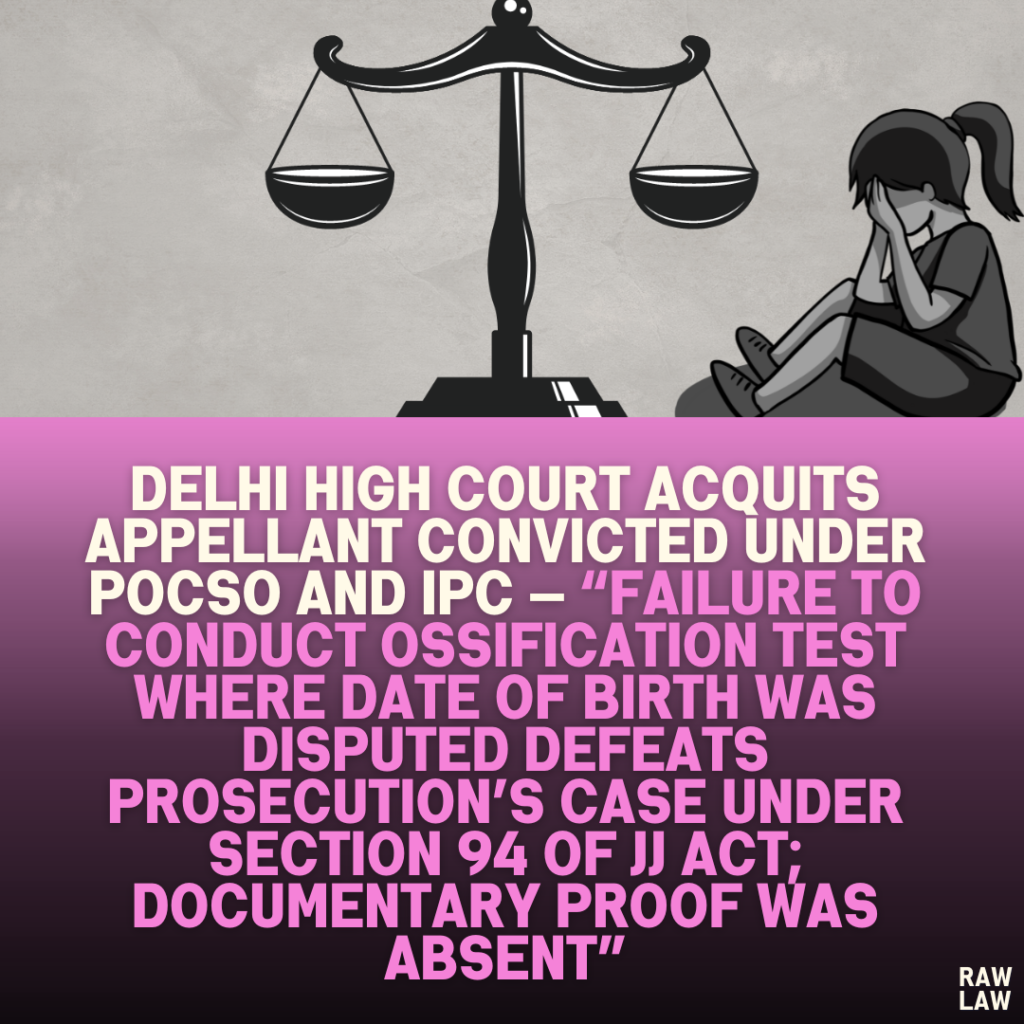Court’s Decision
The Delhi High Court set aside the judgment of conviction dated 04.06.2024 and the order on sentence dated 03.10.2024, passed by the Trial Court convicting the appellant under Section 376(2)(f) of the IPC and Section 6 of the POCSO Act. The Court held that the prosecution failed to prove that the survivor was below 18 years at the time of the incident, and emphasized that “in absence of any documentary proof of the date of birth, the ossification test in terms of Section 94(2)(iii) of the JJ Act ought to have been conducted.” The appellant was acquitted and the appeal allowed.
Facts
On 30.05.2017, a 17-year-old girl was admitted to BSA Hospital and gave birth to a child. Upon inquiry, she alleged that about 10 months prior, her cousin had forcefully established physical relations with her while residing in their house. An FIR was registered under Section 376 IPC and Section 6 of the POCSO Act. Investigation followed, leading to arrest and medical examination of the appellant. Documents from the survivor’s school recorded her birth date as 03.08.1999. The appellant was eventually convicted by the Trial Court and sentenced to 10 years of rigorous imprisonment.
Issues
- Whether the survivor was a minor at the time of the alleged offence.
- Whether the appellant was rightly convicted under Section 6 of the POCSO Act and Section 376(2)(f) IPC.
- Whether the conviction was sustainable in light of contradictions in the survivor’s statements and lack of medical age verification.
Petitioner’s Arguments
- The survivor gave conflicting timelines regarding the appellant’s residence and the date of the incident.
- She admitted during trial that the relationship was consensual.
- She stated her date of birth was Holi in March 1998, contradicting the school record.
- School records were based solely on parental input with no corroborative documentation like a birth certificate.
- No ossification test or medical age determination was conducted as mandated under Section 94 of the JJ Act.
- The charge under Section 5(m) POCSO was inapplicable since it pertains to children below 12 years.
- DNA samples were collected without consent, violating procedural law.
Respondent’s Arguments
- The survivor had stated she voluntarily had relations with the appellant, but being a minor, her consent was immaterial.
- School records showed her date of birth as 03.08.1999, making her 17 at the time of the incident.
- The survivor’s and her parents’ testimonies supported her being a minor.
- The appellant admitted to physical relations in his Section 313 CrPC statement.
- There was no prejudice caused by the framing of charges under Section 5(m) since the contents of the charge were clear.
Analysis of the Law
The Court applied the standards under Section 94 of the Juvenile Justice (Care and Protection of Children) Act, 2015. The three-tiered approach for age determination includes:
- Date of birth certificate from school or matriculation certificate.
- Birth certificate from municipal or panchayat authorities.
- Ossification or latest medical age determination test.
The Court noted that:
- The school admission register was not supported by any proof of birth.
- No municipal or government-issued birth certificate was produced.
- The survivor herself asserted that she was born in March 1998.
- There was no ossification or medical age test conducted, which was essential given the dispute regarding age.
Precedent Analysis
The Court relied heavily on the Supreme Court’s decision in P. Yuvaprakash v. State Rep. By Inspector of Police (2023), where the apex court emphasized that in absence of authentic documentary proof, medical age determination becomes necessary. It also cited Abuzar Hossain v. State of West Bengal and reiterated that school transfer certificates without foundational proof cannot be treated as conclusive evidence of age.
Court’s Reasoning
- The survivor gave a voluntary and consistent account of her age as being born in March 1998 and that the relationship was consensual.
- The prosecution failed to prove her minority beyond reasonable doubt by not conducting an ossification test.
- The school register was not corroborated by valid documentation.
- The testimony of the survivor was credible regarding her age and voluntariness.
- The Trial Court erred in rejecting her statement and convicting based solely on school records.
Conclusion
The Court held that in light of the inconsistencies in evidence and the failure to conduct an ossification test as mandated under Section 94(2)(iii) of the JJ Act, the benefit of doubt must go to the appellant. Consequently, the conviction under the POCSO Act and IPC was set aside and the appellant acquitted.
Implications
This judgment reaffirms the importance of strict adherence to statutory procedures in cases involving determination of age under the POCSO and JJ Acts. It clarifies that school records unsupported by primary documents are insufficient when age is disputed and reinforces the evidentiary value of ossification tests. The ruling strengthens procedural safeguards for accused persons while underlining the prosecutorial burden in statutory rape cases.
